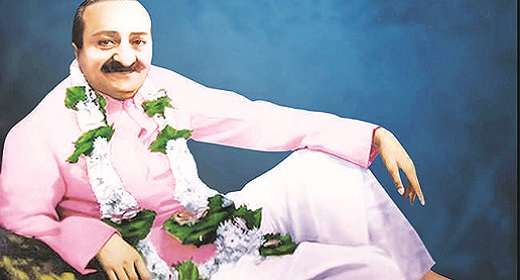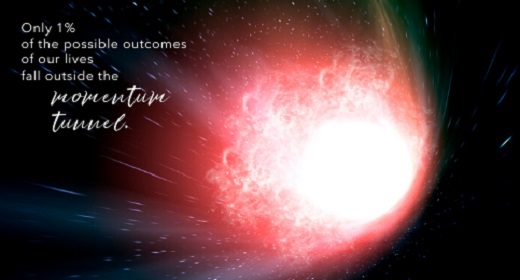Donna Quesada for Awaken: Thank you for spending this time with us, Dear Meher Baba. It is greatly appreciated.
 May we start with a bit of a deep question… Is there a supreme purpose to our lives that surpasses our individual pursuits?
May we start with a bit of a deep question… Is there a supreme purpose to our lives that surpasses our individual pursuits?
Meher Baba: The goal is to realize the reality and attain the “I Am God” state in human form.
Awaken: What do you mean by “the reality?”
Meher Baba: A reality which is deeper than the changing forms…
Awaken: And by changing forms, I take it that you mean the fleeting nature of everything in the material world, which is characterized by so much suffering? If so, is the suffering inevitable?
Meher Baba: All persons have to pass through the state of bondage, but this period of bondage is not to be looked upon as a meaningless episode in the evolution of life. One has to experience being caged if he is to appreciate freedom. If in the entire span of its life, the fish has not come out of water even once, it has no chance of appreciating the value of water. From its birth ‘till its death it has lived only in water; and it is not in a position to understand what water really means for its being. But if it is taken out of water even for a moment, it longs for water and becomes by that experience qualified for appreciating the importance of water.
In the same way, if life had been throughout free and had known no bondage it would have missed the real significance of freedom. The experience of spiritual bondage and the intense desire to be free from it are both a preparation for the full enjoyment of the freedom which is to come.
Awaken: So, you are saying that suffering, and more specifically, the desire to be free from suffering, enhances our appreciation of the greater pleasures that will surely come if we pursue our true goal, which is to attain the I am God state?
Meher Baba: Bondage adds to the value of freedom. As the fish, which is taken out of water, longs for going back to water, the aspirant who has perceived the goal longs for being united with God. In fact, the longing to go back to the source is present in each being from the very time that it gets separated from the source by the veil of ignorance: but it is unconscious ‘till the aspirant enters the Path.
One can, in a sense, become accustomed to ignorance just as a person in a train might get accustomed to the darkness of the tunnel through which the train has been passing for some time; but there is even then a definite discomfort and a vague and undefinable sense of restlessness owing to the feeling that something is missing.
This something is from the very beginning, apprehended as that which has tremendous significance for him. In the stages of dense ignorance, this something is often inadvertently identified with the variegated things of this mundane world; but when the experience of this world is sufficiently mature, the repeated disillusionment in relation to them puts the man on the right track for the thing which is missing. From that moment he seeks a Reality which is deeper than the changing forms and this moment might aptly be described as the first initiation of the aspirant. From the moment of initiation into the Path, the longing to unite with the source from which he has been separated becomes articulate and intense. Just as the entrained person in the tunnel longs for light all the more intensely after he seeks a streak of light coming from the other end, the person who has got a glimpse of the goal longs to hasten towards it with all the speed which he can command.
Awaken: The analogy of the fish longing to get back to the water is very helpful… Like us in our state of bondage…longing to be reunited with God, it is a desire which appears only when the fish is separated from the water. If and when this state of wholeness is realized, how does it change our lives?
Meher Baba: The God-man knows himself to be Infinite and beyond all forms, and can, therefore, with complete detachment, remain conscious of the creation, without being caught up in it.
No longer for him is the limited life of finite mind; no longer for him are the pains and the pleasures of duality; no longer for him is the emptiness and the vanity of separate ego. He is consciously one with all life. Through his universal mind, he not only experiences the happiness of all minds, but also their suffering: and since due to ignorance, most minds have a great preponderance of suffering over happiness, the suffering, which thus comes to the God-man because of the condition of others, is infinitely greater than happiness.
The suffering of the God-man is great: but the infinite bliss of the God-state, which he constantly and effortlessly enjoys, supports him in all the suffering which comes to him, with the result that he remains unmoved and unaffected by it.
The union, which the God-man has with God, is perfect: and even when he has come down in duality for his universal work, he is not aloof from God even for a second. In his normal state as man, he has to be on the level of all and eat, drink and suffer like others; but since, he retains his God-hood, even while he does all these things, he has constant experience of peace, bliss and power. For example, Christ did suffer on the cross; but He was not affected by it, because, in the continuous knowledge, which His conscious God-hood gave Him, He at the same time, knew that everything in the world of duality is illusion and was sustained by the bliss of union with God.
Awaken: So, the man or woman who has realized the divine within, still suffers, due to the conditions of being encased in a fleshly body, but this suffering is experienced differently?
Meher Baba: The God-Man is not affected by suffering as God, the God-man sees all souls as his own; he sees himself in everything and his universal mind includes all the minds in its scope. The God-man knows himself to be one with all the other souls in bondage. Although he knows himself to be identical with God and is thus eternally free, he also knows himself to be one with the other souls in bondage and is thus vicariously bound: and though he constantly experiences the eternal Bliss of God-realization, he also vicariously experiences suffering owing to the bondage of other souls, whom he knows to be his own forms.
This is the meaning of Christ’s Crucifixion. The God-man is, as it were, continuously being crucified: and he is continuously taking birth. In the God-man, the purpose of creation has been completely realized; and he has nothing to obtain for himself by remaining in the world: yet he retains his bodies and continues to use them for emancipating other souls from bondage and helping them to attain God-consciousness.
Awaken: It reminds me of the Buddhist Boddhisattva ideal! The higher perspective we are able to adopt in relation to our suffering lessens its magnitude and impact, in a sense, in that we are onto the game, so to speak?
Meher Baba: The life in eternity knows no bondage, decay or sorrow. It is the everlasting and ever renewing self-affirmation of conscious, un-limitable divinity. My mission is to help you inherit this hidden treasure of the Self.
Awaken: Said as simply as possible, our only true mission is to come to understand that in this material world, things appear as separate, and we feel separate, too… but like a wave crashing into the sea, only to realize that it is one and the same as the wave, our mission is to unite with God—our true identity…
Meher Baba: The individual soul is entangled in the world of forms and does not know itself as part and parcel of the being of God. This ignorance constitutes the bondage of the soul; and spiritual sadhana must aim at securing emancipation from this bondage.
Awaken: How do we know when our sadhana, or spiritual practice, is working?
Meher Baba: What is needed is an internal renunciation of craving for the things of this world; and when craving comes to be given up, it matters little whether the soul has or has not externally renounced the things of this world, because the soul has internally disentangled itself from the illusory world of forms… Sadhana is spiritually fruitful if it succeeds in bringing the life of the individual in tune with the Divine Purpose, which is to enable every one to have conscious enjoyment of the God-state.
Awaken: In this sense, perhaps our cravings for the small comforts of this world come from the desire to escape from the chaos, war and destruction, which is so widespread? Our Sadhana seems not merely a welcome respite from that, but the true way to lift ourselves out of the madness that is all around! What is the cause of all the disharmony?
Meher Baba: At present, the urgent problem, with which humanity is faced, is to devise ways and means of eliminating competition, conflict and rivalry in all the subtle and gross forms, which they assume in the various spheres of life. Military wars are of course the most obvious among the sources of chaos and destruction.
However, wars, in themselves, do not constitute the central problem for humanity, but are rather the external symptoms of something graver, which is at their root. Wars and the suffering, which they bring, cannot be completely avoided by a mere propaganda against wars; if they are to disappear from human history, it is necessary to tackle their root-cause. Even when military wars are not being waged, individuals or groups of individuals are constantly engaged in economic or some other subtle form of warfare: and the military wars, with all the cruelty which they involve, arise only when these underground causes are aggravated.
Awaken: The root cause is the rivalry and competition between us?
Meher Baba: The root-cause of the chaos, which precipitates itself in wars, is, that most persons are in the grip of egoism and selfish considerations; and they express their egoism and self interest individually as well as collectively. This is the life of illusory values in which men are caught. To face the Truth is to realize that life is one, in and through its manifold manifestations; and to have this understanding is to forget the limiting self in the realization of the unity of life.
Awaken: Are you saying that if properly understood and addressed, problems of this scope, such as war, could be rectified?
Meher Baba: With the dawn of this true understanding, the problem of wars would immediately disappear. Wars have to be so clearly seen to be both unnecessary and unreasonable that the immediate problem would not be to stop wars but to wage them spiritually against the attitude of mind responsible for such a cruel and painful state of things. In the light of the Truth of the unity of all, life co-operative and harmonious becomes natural and inevitable.
Hence, the chief task before those, who are deeply concerned with the rebuilding of humanity, is to do their utmost in dispelling the spiritual ignorance, which envelops humanity. Wars do not arise merely to secure material adjustment: they are often the product of uncritical identification with the narrow interests, which through association come to be included in that part of the world, which is regarded as “mine.”
Awaken: Many people don’t realize the spiritual crisis that lies underneath political crisis. So, to be very clear, how does spirituality tie in?
Meher Baba: Spiritual experience has a hold on the deeper truths, which are inaccessible to mere intellect; it cannot be born of unaided intellect. Spiritual truths can often be stated and expressed through the intellect; and the intellect surely is of some help for the communication of spiritual experience. But by itself, the intellect is insufficient to enable man to have spiritual experience or to communicate it to others.
If two persons have had a headache they can co-operatively examine their experience of the headache and make it explicit to themselves through the work of the intellect. But, if a person has never experienced a headache, no amount of intellectual explanation will be enough for making him understand what a headache is. A man must have the headache if he is to know what it truly is: and in order that he should understand it, he may have to be hit on the head.
Intellectual explanation can never be a substitute for spiritual experience; it can at best prepare the ground for the appearance of that experience.
Awaken: I see… spiritual awakening gives us the deeper experience of oneness, which enables the natural feelings of love and compassion to arise. And where these feelings are present, it becomes impossible for us to kill one another!
Meher Baba: Among the people of the earth there is no difference of opinion that, no matter how we reach it, whether through philosophy, logic, spiritual idealism or through work… LOVE, moving through all forms of life, is the most potent power in the universe. It is one thing, however, to reason about it, and quite another to partake of it. The only one through whom we may taste the joy of God is the man who has become transformed by means of love.
Awaken: Would it be fair to say that in order to truly be transformed by the power of love, one must have a mysticalexperience? And if so, I fear we don’t stand a chance as a species, since most people are simply too busy and otherwise engaged with worldly concerns…
Meher Baba: Mysticism is often regarded as something anti-intellectual, obscure and confused, or impractical, and unconnected with experience; but in fact true mysticism is none of these. There is nothing irrational in true mysticism, when it is, as it should be, a vision of Reality as it is; it is a form of perception, which is absolutely unclouded; it is so practical that it can be lived every moment of life and can be expressed in every-day duties; and its connection with experience is so deep that, in one sense, it is the final understanding of all experience.
When spiritual experience is described as being mystical one should not assume that it is something supernatural or entirely beyond the grasp of human consciousness; all that is meant is that it is not accessible to the limited human intellect, unless it transcends its limits and is illumined by the direct realization of the infinite.
Christ pointed out the way to the spiritual experience when he said: “Leave all and follow me.” This meant that man has to leave his limitations and get established in the infinite life of God. Real spiritual experience not only involves the realization of the soul on the higher planes, but also a right attitude to worldly duties and every-day life; if it loses its connection with experience or the different phases of life, what we have is a neurotic reaction, which is far from being a spiritual experience.
Awaken: What I am understanding is that the mystical experience, as you speak of it now, refers not so much to the need of a physical renunciation, but rather an internal one, in which our perspective and interpretation of the events in our lives are always infused with the remembrance of God. Do you think that the many religious followers in the world are practicing in this spirit?
Meher Baba: Most persons do not even suspect the existence of God and they are naturally not very keen about God. There are others who, through the influence of tradition, belong to some faith or another and catch the belief in the existence of God from their surroundings; but their faith is just strong enough to keep them bound to certain rituals, ceremonies or beliefs and rarely possesses that vitality which is necessary to bring about a radical change in the entire attitude to life. There are still others who are philosophically minded and they have an inclination to believe in the existence of God either because of their own speculations or because of the assertions of others. For them, God is at best a probable hypothesis or an intellectual idea. But such lukewarm belief in itself can never be a sufficient incentive for launching upon a serious search for God. They do not know of God from personal knowledge, and God is not for them an object of intense desire or endeavor.
Awaken: A true mystic is one who longs for the direct experience of God as fervently as one thirsts for water after three days in the Sahara…
Meher Baba: A true aspirant is not content with such knowledge of spiritual realities as might be based on hearsay; nor is he satisfied with pure inferential knowledge. For him, the spiritual realities are not the object of idle thinking and the acceptance or the rejection of these realties are both fraught with momentous implications for his inner life. So, he naturally insists upon direct knowledge about them.
This might be illustrated from the life of a great sage. One day he was discussing spiritual topics with his friend who was quite advanced upon the Path. While they were thus engaged upon this discussion, their attention was diverted to a dead body which was being carried by their side. “This is the end of the body but not of the soul,” his friend remarked. “Have you seen the soul?” asked the sage. “No” was the answer of his friend. And the sage remained skeptical about the soul, for he insisted upon personal knowledge.
Awaken: For those that hunger for this direct knowledge of God, what about other avenues into the mystical experience, such as hallucinogenics?
Meher Baba: It is absolutely essential for a spiritual aspirant who genuinely longs for union with God—the Reality—to shun experiments with the effects of certain drugs. These things do not uplift the aspirant nor draw him out of the rut of Illusion. Experiences born of these practices wear off as soon as the aspirant withdraws from or is thrown out of the orbit of the effect produced by the technique employed.
Awaken: Some claim that these psychedelic experiences enable a kind of breakthrough, which in turn facilitates advancement on the spiritual path…
Meher Baba: There is no drug that can promote the aspirant’s progress—nor ever alleviate the sufferings of separation from his beloved God. LOVE is the only propeller and the only remedy. The aspirant should love God with all his heart ‘till he forgets himself and recognizes his beloved God in himself and others.
Even the experiences of the planes of consciousness are only another kind of an illusion! Experiences of the planes are Real Illusion, whereas those derived from the use of drugs are illusion into False Illusion.
An individual may feel LSD has made a “better” man of him socially and personally. But one will be a better man through Love than one can ever be through drugs or any other artificial aid. And the best man is he who has surrendered himself to the Perfect Master irrespective of his personal or social standing.
The one and only true experience is the experience of the Truth, the Reality; for once the realization of God is attained, it remains a continual and never-ending experience. The all-pervading effulgence of God the Reality can only be experienced by an aspirant who keeps himself scrupulously above all Illusory experimentations and humbly takes refuge in love of God. God can only be realized by loving Him with all the love at one’s command—pure, simple and unadulterated love. When one’s love for God, and God alone, is at its zenith, true longing for union with God is greatest, and the aspirant’s ego assertion is then at its lowest point.
Awaken: In my own path, the importance of raising the kundalini energy is emphasized. Would you share your thoughts about kundalini and its role in opening the door into God Realization?
Meher Baba: The higher bodies function either by impersonal and unconscious forces or by conscious forces. Kundalini is a latent power in the higher body. When awakened it pierces through six chakras or functional centers and activates them. Without a master, awakening of the kundalini cannot take any one very far on the Path; and such indiscriminate or premature awakening is fraught with dangers of self-deception as well as misuse of powers.
The kundalini enables man consciously to cross the lower planes and it ultimately merges into the universal cosmic power of which it is a part, and which also is at times described as kundalini. Ordinarily kundalini is the name for the power latent in the individualized soul. The awakened kundalini cannot by itself take any one to the seventh plane. When awakened and directed under the guidance of some great yogi, it can give many rare experiences which have both advantages and disadvantages.
The important point is that the awakened kundalini is helpful only up to a certain degree, after which it cannot ensure further progress. It cannot dispense with the need for the grace of a Perfect Master.
Awaken: The search for the right master can be arduous… how does one go about finding his/her master?
Meher Baba: The descent of the Grace of the Master is conditioned by the preliminary spiritual preparation of the aspirant. This preliminary spiritual preparation for Grace is never complete until the aspirant has built into his psychic make-up some divine attributes. When a person avoids back-biting and thinks more of the good points in others than of their bad points and when he can practice supreme tolerance and desires the good of others, even at the cost of his own self, the aspirant is ready to receive the Grace of the Master.
Awaken: So, it is a case of… when the student is ready, the master will appear? How else might we ready ourselves?
Meher Baba: One of the greatest obstacles which hinders this spiritual preparation of the aspirant is worry; and when with supreme effort this obstacle of worry is overcome, a way is paved for the cultivation of the divine attributes which constitute the spiritual preparation of the disciple. As soon as the disciple is ready, the Grace of the Master descends; for the Master who is the ocean of Divine Love is always on the look out for the soul in whom his Grace will fructify.
Awaken: Why is it so hard to find a true teacher? And why have there been so many false Gurus that have been exposed, as of late?
Meher Baba: In this world of innumerable frailties, the greatest of all frailties is the common fault of not being able to face, accept and acknowledge one’s own weaknesses. This is the frailty of all frailties. It gives rise to hypocrisy. Hypocrisy is said to be the tribute which vice pays to virtue… This is the origin of the fraudulent saint or the spiritual jingo, who walks and talks with his nose in the air and arms akimbo as if he were somebody very special… Among the claimants for spirituality, there are very few who sincerely believe in their own claim and then take their stand by it.
Most of them are self-deceived. Such persons deceive themselves before they start deceiving others. But even if they are thoroughly self-deceived, they can wriggle their way out from the tentacles of spiritual jingoism as soon as they discover that they had overestimated their own spiritual achievements. There is a faint ray of hope for their coming around to the Truth because they are not consciously dishonest.
On the other hand, conscious and deliberate impostors in the field of spirituality are at once the most confirmed culprits and the most piteous victims. They get stuck deeper and deeper in the quagmire of their own creation until everyone, including themselves, loses all hope of their redemption.
Awaken: That explains the importance of the search, since as you have explained, the grace of the master is the ideal and most efficient way to realization…
Meher Baba: Of all the high roads which take the pilgrim directly to his divine destination, the quickest lies through the Avatar. To the one who has unfaltering love for the Avatar, the way to abiding truth is clear and safe. Such a one must waste no time playing with things that do not matter. Loyalty to the unchangeable truth, guided by enduring love, is the simple way that leads to God and abiding peace… the past, present and future of the individual are drowned, and during his implicit obedience to the master, he is no longer bound by those actions, good and bad. Such complete surrender is in itself complete freedom.
Awaken: But there are other pathways… Could you outline them for me?
Meher Baba: Complete surrender to the Avatar is not possible for one and all. When this is not possible, the other high roads which can eventually win the grace of God are:
(1) Loving obedience to and remembrance of the Avatar to one’s ability;
(2) Love for God and intense longing to see Him and to be united with Him;
(3) Being in constant company with the saints and lovers of God and rendering them whole-hearted service;
(4) Avoiding lust, greed, anger, hatred and the temptations of power, fame and faultfinding;
(5) Leaving everyone and everything in complete external renunciation and, in solitude, devoting oneself to fasting, prayer and meditation;
(6) Carrying on all worldly duties with a pure heart and clean mind and with equal acceptance of success or failure, while remaining detached in the midst of intense activity; and
(7) Selfless service of humanity, without thought of gain or reward.
Awaken: I recognize here the major Paths of Yoga, in which selfless service and devotion reign supreme. But is there one which you feel to be superior?
Meher Baba: The best of all forces, which can overcome all difficulties on the way, is the love that knows how to give without need to bargain for a return. Pure love is matchless in majesty; it has no parallel in power, and there is no darkness it cannot dispel. God only listens to the language of the heart and its message of love, which needs no ceremony or show, only silent devotion for the Beloved.
Awaken: You are referring to Bhakti… love and devotion.
Meher Baba: Pure love which is awakened through the Grace of the Master, is more valuable than any other method which may be adopted by the aspirant. Such love not only combines in itself the merits of all the disciplines but excels them all in its efficacy to lead the aspirant to his Goal.
When this love is born, the aspirant has only one desire; and that one desire is to be united with the Divine Beloved. Such withdrawal of consciousness from all other desires leads to infinite purity; therefore nothing purifies the aspirant more completely than this love. The aspirant is ever willing to offer everything for the Divine Beloved; and no sacrifice is too difficult for him.
Awaken: Why is divine love so powerful? In other words, as strange as it sounds to put it this way, how does the process work?
Meher Baba: All his thoughts are turned away from the self and come to be exclusively centered on the Divine Beloved. And through the intensity of this ever-growing love, he eventually breaks through the shackles of the self and becomes united with the Beloved. This is the consummation of love. When love has thus found its fruition it has become Divine.
Awaken: I understand… focusing on that which is infinitely grander than our petty attachments eventually begins to collapse the grip of our ego?
Meher Baba: The sojourn of the soul is a thrilling divine romance, in which the lover, who in the beginning is conscious of nothing but emptiness, frustration, superficiality and the gnawing chains of bondage, gradually attains an increasingly fuller and freer expression of love and ultimately disappears and merges into the Divine Beloved to realize the unity of the lover and the Beloved in the supreme and eternal fact of God as infinite love.
Awaken: I love the expression “divine romance!” Yet it has nothing to do with the way we ordinarily use that word…romance. How is divine love altogether different than human love?
Meher Baba: Divine Love is qualitatively different from human love. Human love is for the many in the One and Divine Love is for the One in the many. Human love leads to innumerable complications and tangles; but Divine Love leads to integration and freedom. In Divine Love, the personal and the impersonal aspects are equally balanced; but in human love the two aspects are in alternating ascendancy. When, in human love, the personal note is predominant, it leads to a man’s being utterly blind to the intrinsic worth of other forms; and when, as in the sense of duty, love is predominantly impersonal, it often makes him cold, rigid and mechanical. The sense of duty comes to the man as external constraint of behavior; but in Divine Love there is unrestrained freedom and unbounded spontaneity. Human love in its personal and impersonal aspects is limited; but Divine Love with its fusion of the personal and the impersonal aspects is infinite in being and expression.
Awaken: Ahh, it comes down to the total absence of selfishness in divine love…
Meher Baba: Divine Love arises after the disappearance of the individual mind and is free from the trammels of individual nature. In human love the duality of the lover and the Beloved persists; but in Divine Love the lover and the Beloved become one. At this stage, the aspirant has stepped out of the domain of duality and become one with God: for Divine Love is God. When the lover and the Beloved are one, that is the end and the beginning.
Awaken: You are saying that in the context of human love, there is always an agenda of some sort?
Meher Baba: Human love makes its appearance in the matrix of ego-consciousness, which has its countless desires. Love is colored by these factors in many ways. Just as we get an ever-changing variety of designs in the kaleidoscope by the various combinations of simpler elements, we get an almost limitless qualitative variety in the range of love owing to novel combinations of psychic factors. And just as there are infinite shades in the colors of different flowers, there are in human love diverse delicate differences.
Human love finds itself encircled by a number of obstructive factors like infatuation, lust, greed, anger and jealousy. In one sense, even these obstructive factors are either forms of lower love or the inevitable side-results of these lower forms of love. Infatuation, lust and greed might be looked upon as perverted and lower forms of love. In infatuation a person gets enamored of a sensual object; in lust he develops a craving for sensations in relation to it; and in greed he desires to possess it.
Awaken: There’s always a limitation to the full expression of love…
Meher Baba: These lower forms of love are obstructive to the release of pure love. The stream of love can never become clear and settled until it is disentangled from these limiting and perverting forms of lower love. The lower is the enemy of the higher. If consciousness gets caught in the rhythm of the lower, it cannot emancipate itself from its self-created ruts and finds it difficult to get out of them and advance further. Thus the lower form of love continues to interfere with the development of the higher form of love and has to be given up in order to allow the untrammeled appearance of the higher form of love.
Awaken: And in terms of how infinite love manifests within us… doesn’t it feel more expansive, in terms of the way it is experienced?
Meher Baba: Lust is experienced as being heavy and love is experienced as being light. In lust, there is a narrowing down of life and in love there is an expansion in being. To have loved one soul is like adding its life to your own, your life is, as it were, multiplied and you virtually live in two centers. If you love the whole world, you vicariously live in the whole world. But in lust there is the ebbing down of life and the general sense of hopeless dependence upon a form which is regarded as another. Thus, in lust there is the accentuation of separateness and suffering: but in love — there is the feeling of unity and joy. Lust is dissipation; love is recreation. Lust is a craving of the senses; love is the expression of the spirit. Lust seeks fulfillment but love experiences fulfillment. In lust, there is excitement; but in love there is tranquillity.
Awaken: I love that! Lust contracts us, and leaves us dependent on the object, whereas love expands us into oneness…
Meher Baba: Love is equally different from greed. Greed is possessiveness in all its gross and subtle forms. It seeks to appropriate gross things and persons as well as the abstract and intangible things like fame and power. In love, the annexation of the other person to your individual life is out of question, and there is a free and creative outpouring that enlivens and replenishes the psychic being of the beloved independently of any expectations for the self.
And we have the paradox, that greed which seeks for the self the appropriation of another object does in fact lead to the opposite result of bringing the self under the tutelage of the object; and love, which aims at giving away the self to the object does in fact lead to a spiritual incorporation of the beloved in the very being of the lover.
In greed the self tries to possess the object, but is itself spiritually possessed by the object: and in love the self offers itself to the beloved without any reservations, but in that very act it finds that it has included the beloved in its own being.
When pure Pure Love is awakened through Grace, love is first received as a gift of the Master, it comes to be lodged in the consciousness of the aspirant like the seed in a favorable soil, and in the course of time, the seed develops into a plant and then into the full-grown tree.
Awaken: So, love is the driving force of existence and the ultimate goal of everything…
Meher Baba: It is for the sake of Love that the whole universe sprang into existence and it is for the sake of Love that it is kept going. God descends into the realm of illusion because the apparent duality of the Beloved and the Lover is eventually contributory to His conscious enjoyment of His own divinity. The development of love is conditioned and sustained by the tension of duality. God has to suffer the apparent differentiation into the multiplicity of souls in order to carry on the game of Love. They are His own forms and in relation to them He at once assumes the role of the Divine Lover and the Divine Beloved. As the Beloved, He is the real and the ultimate object of their appreciation; and as the Divine Lover, He is their real and Ultimate Savior, drawing them back to Himself.
Awaken: To paraphrase what you are saying… God multiplies Himself and turns Himself into everything for the sake of continuing the “game of seeking”… a sort of hide and seek! But as He splits Himself into a billion pieces, the world of duality and illusion is born. That is, until we are subsumed back into Him through Self-realization.
Meher Baba: Though the whole world of duality is only an illusion, that illusion has come into being for a significant purpose. Love is the reflection of God’s Unity in the world of duality. It constitutes the entire significance of creation.
Awaken: This illusory world though, is quite brutal! There’s so much misery and hatred… and it seems like we’re stuck in an endless loop, repeating the same mistakes and creating the same wars and havoc over and over again. For many, it’s not a fun game of “hide and seek” at all.
Meher Baba: The whole world is a prison… The Soul’s apparent imprisonment becomes so suffocatingly unbearable that a time comes when, by the Master’s grace, it literally tears itself free, as if from shackles. And when at last freed, the feeling of exultation is as powerful as was its feeling of suffocation. The experience of both imprisonment and release is of illusion, but the experience of the final freedom is of Reality. The emancipated Soul then experiences continuously and eternally its own infinite freedom.
The world exists only as long as the Soul experiences bondage. When the Soul realizes itself as Reality, the world vanishes — for it never was, and the Soul experiences itself as being Infinite and Eternal.
Awaken: What do you really mean when you speak of the Soul?
Meher Baba: The human soul has three bodies — gross, subtle and mental. Though overlapping each other, they would still impel the soul in three psychic dimensions were there no point of interaction or fusion between them. This contact of the intertwining bodies invites action and interaction between the three bodies.
Awaken: Is this similar to the Christian trinity?
Meher Baba: The relation between cosmic power and the individualized soul is unique. In the case of a perfect soul, the relation has been described fairly adequately through the Christian idea of trinity, which comprehends the three aspects of God: the Father (Creator and Preserver), the Son (Savior and Redeemer) and the Holy Ghost (the Spirit of truth or grace). This concept of Trinity (Three in One) grasps and expresses some important factors in the spiritual fabric of the universe.
It should not be artificially equated with the Vedantic trinity of the Creator, Preserver and Destroyer, which reveals the fabric of the universe from a different point of view. All these are different ways of understanding the unitary and omnipotent power in the cosmos.
Awaken: One very different point of view concerns the idea of karma, I believe… Would you explain the way a Soul is driven forth by way of this universal law and how this dynamic is reconciled with the emphasis you place on finding a master? For example, can one’s master interrupt a disciple’s karma?
Meher Baba: Through surrender, the aspirant throws the burden of his Karma on the Master, and through service of the Master, he gets an opportunity to get clear. The relation between Master and disciple may be carried on from one life to another for several reincarnations. If the Master who has given instruction and help to a group of disciples takes an incarnation for his work, he usually brings them with him as his group of disciples to help them further on their Path.
Those who have been connected with him in past lives are drawn to him by an unconscious magnetism. There is usually a long history to the Master; the disciple is often beginning where he had left off in the last incarnation.
Awaken: I’d like to make clear the impersonal nature of karma, as many in the west mistakenly interpret it through the lens of sin, which carries the idea of individualized punishment. But it is merely a causal phenomenon, right?
Meher Baba: The law of Karma is the counterpart of the law of cause and effect, which operates in the physical world. If there were no law of cause and effect in the physical world there would be chaos. In the same way, if there were no law of Karma in the world of values, there would be uncertainty in values, and people would not know whether they were to expect good or bad from their actions. In the physical world there is the law of conservation of energy, and in the world of values, there is the law that once Karma comes into existence, it persists until it bears its own fruit or is undone through counter-Karma.
The series of incarnations that the soul is impelled to take through Karmic determination has a tendency to become endless. Through innumerable lives the aspirant has come into contact with countless persons. He is entangled in a web of debts to pay and dues to recover, and according to the Karmic law, he can neither avoid the debts nor the dues, since both are the outcome of desire. He keeps incarnating to pay off his debts and to recover his dues, but even when he means to clear up the account he is often unable to do so.
Awaken: But you were just saying that this endless process of reincarnations (Samsara) may be mitigated by the Master?
Meher Baba: The carrying on of Karmic debts and dues would be endless were there no provision for release from them through the help of the Master, who can not only initiate the aspirant into the art of unbinding Karma, but can directly become instrumental in freeing him from his Karmic entanglements. The Master has attained unity with God, whose cosmic and universal life includes all persons, and he can in his representative capacity become for the sake of the aspirant the medium for clearing up the debts and dues he has incurred in his incarnations.
Awaken: Do some masters remember their own previous incarnations?
Meher Baba: The memory of past lives does not, except in abnormal and rare cases, come back to a person, unless he is sufficiently advanced from the spiritual point of view; this provision, made by the laws of life, secures unhampered spiritual evolution of the individualized soul. On the first view, it might seem that the loss of the memory of previous lives, is all a loss; but this is far from being so. For most purposes, knowledge about past lives is not at all necessary for the guidance of the onward course of spiritual evolution. Spiritual evolution consists in guiding life in the light of the highest values, perceived through intuition and not in allowing it to be determined by the past.
Life would be infinitely more complicated if one who is not spiritually advanced is burdened by the conscious memory of numberless past lives; and he would get dazed and unsettled by the diversity of settings in which persons would appear to him in the light of his memory. But he is not called upon to face such confusion, because he is shielded from the resurrection of the memory of past lives.
Awaken: We have spoken so much of the importance of attaining God-Realization, but I’d like to ask you now outright, what is God?
Meher Baba: God may be compared to the sandalwood. It continually emits a sweet scent in all directions, though only those who take the trouble to go near it have the benefit of its charming fragrance. But we cannot say that the sandalwood has done anything in particular towards those who approach it, because emanation of its sweet scent is going on all the time and is not specifically directed towards any person or persons. It is available to each and all who care to come within its range.
Thus the sandalwood gives in one sense; and in another sense it does not give. Take another example. The river gives water to those who are thirsty in the sense that if thirsty persons approach the river and drink its waters, their thirst is quenched; but the river does nothing either to invite them to itself or to fill them with its waters. These examples show how God does everything and at the same time does nothing.
Awaken: Earlier, you spoke of the problem and futility of worry. I would be remiss if I didn’t mention for our readers that you are the origin of the phrase Don’t Worry Be Happy — which, as many people will remember, was made into a very popular song by Bobby McFerrin in the eighties. I admit to my own struggle with this one! Can you speak to the problem of worry and why it is such a hindrance on the spiritual path?
Meher Baba: There are very few things in the mind which eat up as much energy as worry: and it is one of the most difficult things not to worry about anything. Worry is experienced when things go wrong: but in relation to past happenings, it is idle merely to wish that they might have been otherwise. The frozen past is what it is: and no amount of worrying is going to make it other than what it has been.
But the limited ego-mind identifies itself with its past, gets entangled with it and keeps alive the pangs of frustrated desires; so worry continues to grow into the mental life of man until the ego-mind is burdened by the past. Worry is also experienced in relation to the future when this future is expected to be disagreeable in some way: and in this case, it seeks to justify itself as a necessary accompaniment of the attempt to prepare for coping with the anticipated situations.
But, things can never be helped merely by worrying. Besides, many of the things, which are anticipated, never turn up or if they turn up at all, they turn out to be much more acceptable than they were expected to be. Worry is the product of feverish imagination working under the stimulation of desires: it is living through sufferings which are mostly our own creation. Worry has never done anyone any good; and it is very much worse than mere dissipation of psychic energy, for it substantially curtails the joy and fulness of life.
Awaken: Indeed… worrying makes it impossible to truly feel free and happy.
Meher Baba: Among the many things which the aspirant needs to cultivate, there are few which are as important as cheerfulness, enthusiasm and equipoise; and these are rendered impossible unless he succeeds in cutting out worry from his life. When the mind is gloomy, depressed or disturbed, its action is chaotic and binding; hence arises the supreme need of maintaining cheerfulness, enthusiasm and equipoise under all circumstances.
All these are rendered impossible unless the aspirant succeeds in cutting out worry from his life. But worry is a necessary resultant of attachment to the past or to the anticipated future; and it always persists in some form or other until the mind is completely detached from everything.
Awaken: As we aspirants work on creating peace within, what is the best way for us to bring this transformation to the world at large, to create a more peaceful existence for everyone and all creatures?
Meher Baba: The New Humanity will come into existence through a release of love in measureless abundance: and this release of love itself can come through the spiritual awakening brought about by the Masters. Love cannot be born of mere determination: through the exercise of will, one can at best be dutiful. One may, through struggle and effort, succeed in securing that his external action is in conformity with his conception of what is right: but such action is spiritually barren, because it lacks the inward beauty of spontaneous love. Love has to spring spontaneously from within: and it is in no way amenable to any form of inner or outer force.
Love and coercion can never go together; but, though love cannot be forced upon any one, it can be awakened in him through love itself. Love is essentially self-communicative: those who do not have it, catch it from those who have it. Those, who get love from others cannot be its recipients without giving a response, which, in itself, is of the nature of love. True love is unconquerable and irresistible; and it goes on gathering power and spreading itself, until eventually it transforms everyone, whom it touches. Humanity will attain to a new mode of being and life through the free and unhampered interplay of pure love from heart to heart.
Awaken: Love really is the answer!
Meher Baba: When it is recognized that there are no claims greater than the claims of the universal Divine Life which without exception includes every one and everything, love shall not only establish peace, harmony and happiness in social, national and international spheres, but it will shine in its own purity and beauty.
Awaken: And with that beautiful message, I will thank you for your time today, Meher Baba! It is greatly appreciated. May peace prevail!
This is one of Awaken’s Dream Interviews, conducted by Donna Quesada, and All Answers are Verbatim from Meher Baba.









































